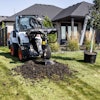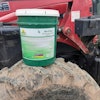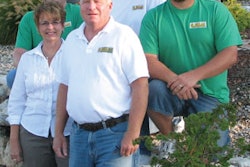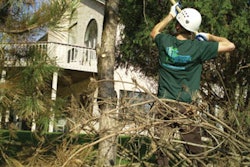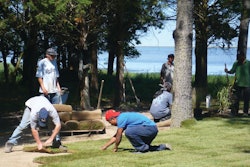
Bob Grover sees himself as both an environmentalist and pragmatist.
Pacific Landscape Management
Hillsboro, OR
pacscape.com
Founded: 2001
Owners: Bob Grover, CLP, CLT; Elias Godinez, CLT
Employees: 85 peak season
Sales Mix: 60% maintenance; 40% light construction, enhancements
Customer Mix: 100% commercial
Orange is more than one of the colors in the spectrum for Pacific Landscape Management president Bob Grover, CLP, CLT. When he and his partners launched their company in 2001, they wanted to stand out. So they painted their trucks orange, wore orange uniforms, and handed out orange business cards. In Grover’s words, “We became the orange company.”
Today, after only eight years in business, that orange company generates $6 million in revenue, almost entirely from commercial maintenance customers. It does this with 85 employees who work out of three Oregon locations: the headquarters in Hillsboro (a western suburb of Portland), and branch locations in Northeast Portland and Tualatin.
“From the very beginning, our mission was to become the greatest and most sophisticated landscape management company in Portland,” Grover recalls. “We wanted to be the smart guys who would provide special products, personalized service at all levels, and the most creative and thoughtful solutions.”
The company was entitled to such a lofty goal. Unlike other startup companies, theirs benefitted from many years of previous experience. Grover alone worked 15 years for highly regarded Northwest Landscape Industries, and later spent another two years with the company after it was purchased by TruGreen LandCare.
After sitting out a year-long non-compete agreement, Grover and his partners hit the ground running, targeting corporate campuses, office complexes, retail outlets, condominiums and homeowner associations. Over the next eight years, the company developed a recognizable brand (in color and deed) and provided a very specialized service to its customers.
“Our entire focus has been to help people get value out of the dollars they spend,” Grover emphasizes. “In many ways, we are very passive salespeople, and look instead to ensure that property enhancements will benefit the customer. Even though light construction and enhancements account for about 40% of our annual revenue, we have never had an incentive program to sell extra work.”
What further separated the new company from the competition, and still does today, is an emphasis on training and education. Partner and co-owner Elias Godinez, CLT, devotes nearly all of his time to training and staffing issues. Employees receive weekly training and are encouraged to advance their professional careers by taking courses that, for example, teach the latest irrigation techniques or prepare them to become licensed pesticide applicators and Certified Landscape Technicians (CLT).
“I was fortunate,” says Grover. “I was able to learn the industry on another company’s dime. My advice to anyone just starting out in this industry or looking to develop a competitive advantage is to take every opportunity to expand their base of knowledge.
“Giving employees the same opportunity—creating an environment where learning is a fundamental part of work—will help posture your company as an expert in its field and instill a sense of pride and loyalty among your people. We have 12 CLT’s. And this learning culture, along with good benefits and a healthy work environment, is one reason why we haven’t lost a manager in our eight years of operation.”
Green is golden
An unquenchable thirst for knowledge is also the driver behind the company’s latest initiative. Grover explains, “Most of us are in this industry for two reasons: We love plants and we enjoy being outdoors. Personally, I consider myself both an environmentalist and a pragmatist. I’ve always been very interested in the green movement, but at the same time hesitant to offer a service that none of my customers are asking for.”
That hesitation evaporated in the fall of 2007 when green and sustainability became part of Portland’s popular culture. The city took the lead in developing “green” buildings, and the movement naturally spilled outside when property and facility managers started to ask questions about the viability of sustainable landscapes.
Grover and his team took the hint, set a goal to become the leader in the development of sustainable practices, and spent all last year learning about the subject. Since sustainable landscaping practices were not clearly defined and there was no single source of information on the subject, Grover’s team attended seminars, talked with local officials, read volumes of literature, and tested ideas out in the field.
From the research, Grover says he learned three important facts:
1. Offering sustainable services to customers can save them money
2. Providing this service can be profitable
3. If, as a company, you don’t get on board with this movement, you will be left in the dust
Early this year, Pacific Landscape Management launched several initiatives under the brand Sustainable Landscape Solutions. Grover calls the program a holistic approach to being green. As he says, “Just driving around in a Prius doesn’t make the car’s operator a steward of the environment.” Among initiatives, Grover and his team are re-engineering their service offering and organization, and seeking certification where it’s available.
To minimize the impact of landscaping procedures, the company limits the amount of chemicals it uses on properties by integrating organics into fertilizers, and it promotes water-saving technologies. New, lower-emission equipment and vehicles replace older models, and team members are instructed to evaluate customer sites for ecological enhancements.
Closer to home, Pacific Landscape Management installed a bioswale to filter the runoff from its service yard, along with a rain garden to absorb rainwater coming from roof drains. The company converted all lighting to compact fluorescents, and with the help of active management reduced electrical use by 25%.
“We are looking into the installation of solar panels on our roof too,” adds Grover. “Although our facility does not currently meet LEED standards, our modifications improve energy efficiency and are significant steps toward being more environmentally sensitive. We have even expanded our recycling program to include all plastic, in addition to green waste, paper, used oil and metal, which we have always recycled.”
Certifiably green
As part of its expanded recycling program, the company has applied for its Master Recycler certification from Portland. It is also applying for Salmon Safe certification for its facility.
“This certification requires a management program to reduce stormwater runoff and non-point source pollution to help protect Pacific Northwest salmon watersheds,” Grover relates. “Earlier this year we helped one of our customers gain certification for their facility. And we are working with Salmon Safe to develop a landscape management program that our customers can use to ‘fast track’ the landscape portion of their facility’s certification.”
Pacific Landscape Management is also one of the first companies to receive EcoLogical Business Certification from the City of Portland. “Several area jurisdictions have come together to develop a certification program for landscape companies,” says Grover. “The certification recognizes companies that have developed high standards for environmentally friendly design, installation and maintenance services.”
This landscape contractor notes that practicing sustainability right at home is a great way to teach employees and customers about the value of sustainable landscapes. In fact, Pacific Landscape Management is holding a “Sustainable Fair” at its facility June 26, in conjunction with PLANET’s annual leadership meeting, specifically to get that message across to customers and others interested in sustainable landscapes. They plan to bring in expert speakers, showcase sustainable practices, and demo environmentally friendly equipment.
One of the ongoing challenges for landscape management companies is separating themselves from the competition. As Grover notes, that challenge has grown recently thanks in large part to the economy and the subsequent influx of competitors into the landscape maintenance arena.
“You have to be efficient to be competitive,” Grover says, “but that’s not enough. You also have to be smart about training and rewarding employees, interacting with customers, and presenting and marketing your company.”
Staying on the cutting edge of trends can help too, and that’s one of many reasons why the orange company is going green.


